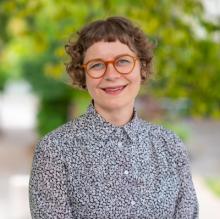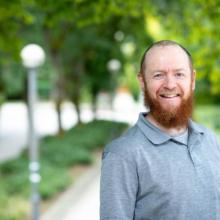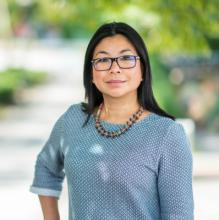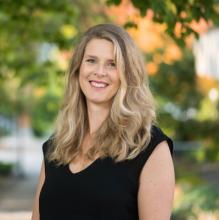By focusing on information sharing I am foregrounding the relational and emergent aspects of research. It is imperative that research engagements, and the artefacts through which they travel, are created mindfully to move information to understanding, and further still to action in and beyond academia.
Research Description
For decades, interdisciplinary scholars have advocated for change in how research is conducted and disseminated, seeking new ways to connect research to real-world issues and the needs of communities. However, researchers face barriers such as time, training, lack of confidence in employing alternative methods (e.g., arts-based research), and reward and evaluation structures in universities that do not recognize non-traditional scholarly outputs. Situated in information studies (IS), this research investigates research-creation (RC), an approach that brings together creative and academic research practices, to conduct and share research. Through the analytical lens of information practice, and with specific focus on information sharing, I seek to understand how research constituents perceive and engage with RC modes and methods to generate new knowledge, negotiate academia, and conceptualize expertise. This exploratory inquiry employs a qualitative, arts-based, and phenomenological approach to investigate information practice with specific focus on information sharing.
What does being a Public Scholar mean to you?
The Public Scholar Initiative emphasizes the undergirding intention of academic research to be outward-facing. It invites me to orient my approach to the research as something that will not just be shared with my committee and disciplinary field of study. Participating in the PSI provides me with the opportunity to have my research project financially supported. The funds provided by the initiative give me a chance to develop some non-traditional research outputs (e.g., artistic material) that may not otherwise be financially possible. Additionally, the PSI puts me in relationships with other scholars in academic settings who are approaching their own work with a mindset not just of individual accomplishment but towards collaborative knowledge generation and creation.
In what ways do you think the PhD experience can be re-imagined with the Public Scholars Initiative?
I think an important aspect of this re-imagining is that currently a lot of non-traditional research outputs (e.g., creative works, curated exhibitions, etc.) are approached as additive— as “in addition to” the “traditional” research outputs (e.g., peer-reviewed publications). The focus on individual authorship of scholarship can detract from the contributions that human and more-than-human participants bring to the research. The requirement of single authorship of a dissertation does not always serve the work that the research has done/is doing. Additionally, by focusing on outputs of research (e.g., a published paper) we can distract from or obscure the process of research. The capacity to create and assess public scholarship in its many forms needs to be built from an openness, curiosity, and dynamism of the various components of the university systems (from administration to community members). In this re-imagining we can consider: what are be being trained to do and how?
How do you envision connecting your PhD work with broader career possibilities?
I envision the work of the PhD to inform my understanding of what a “possibility” even is! I’ve appreciated learning the dynamic and emergent approaches of research-creation practitioners and hope to bring that energy of burgeoning understanding into future contexts.
How does your research engage with the larger community and social partners?
Research-creation methods and modes can challenge entrenched understandings of academic institutions and their relationships with communities, as well as processes of knowledge creation, and the diversity of human experiences. By focusing on information sharing I am foregrounding the relational and emergent aspects of research. It is imperative that research engagements, and the artefacts through which they travel, are created mindfully to move information to understanding, and further still to action in and beyond academia.
Through previous participation in an incredible initiative, Supporting Transparent & Open Research Engagement & Exchange (STOREE), I learned about the importance of how change can ripple outward in planned unexpected ways. This initiative foregrounds the need to build pathways and systems for improved access to and communication about research, including the use of alternative formats.
Why did you decide to pursue a graduate degree?
After completing my Master in Library and Information Studies (Dalhousie University, 2015) I spent several years working in library and archival settings. It was gratifying and generated an increasing curiosity to further develop my research skills. I want to learn how to ask relevant and engaging questions and join the ongoing efforts to develop respectful research practices.
Why did you choose to come to British Columbia and study at UBC?
I decided to study at UBC through a combination of geography and networking. Life circumstances brought me to Vancouver where I had occasion to meet my now supervisor Dr. Heather O’Brien (School of Information). I found her work in user engagement intriguing and she was very encouraging of applying to the PhD program. I was introduced to the Supporting Transparent Open Research Engagement and Exchange (STOREE) initiative, led by Dr. O’Brien, which aims to build pathways and systems for improved communication about research. Through my participation in STOREE I became increasingly interested in ways to exchange knowledge among academic and non-academic communities. I am grateful to the department for seeing the possibility in me through my application and to Dr. O’Brien for her continued support as my research interests take shape.
What is it specifically, that your program offers, that attracted you?
I appreciate the small cohort of the iSchool. It’s great to learn alongside people with a variety of lived experiences and disciplinary backgrounds. Information Studies is a broad and varied field and different approaches are enacted and explored in the iSchool. It’s so valuable to learn from and with each other.
For you, what was the best surprise about graduate life, about UBC or life in Vancouver?
I am very surprised to have grown to love year-round ocean swims! I am grateful to feel small amid the mountains and the water.
What aspects of your life or career before now have best prepared you for your UBC graduate program?
I spent several years working at Library and Archives Canada, an established and storied institution. During my time there I learned about the importance of taking personal responsibility while working in larger institutions. At times I felt like my work was part of something so much bigger than me that it was challenging to find myself in it. I appreciated learning that you can’t always know where or how your work will contribute —not only within the organization you are working for/with but also to broader society.
Do you have any tips for students from your home country coming to Canada / to UBC Grad School?
I would encourage new graduate students to embrace their own non-linear narratives. There’s such beauty in not smoothing out the rough edges and corners of your inquiry. Some people may have a burning question they’ve wanted to explore and engage with for years. But it’s ok if you don’t. Build trust with yourself by sharing your thinking as it progresses. I advise holding conclusions lightly and staying open to having your assumptions challenged. Also, figure out a note-taking strategy that works for you and stick with it!





